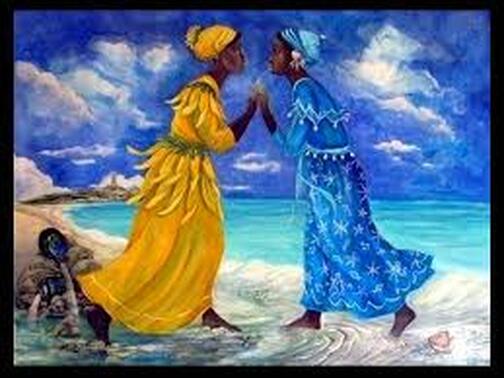Gossip and negative conversations create osogbo
 Tiya-tiya spreads through gossip
Tiya-tiya spreads through gossip General wisdom around the religion says we shouldn't talk too openly or too much about osogbo because we could inadvertently call it into being. Osogbo is the opposite of blessings. It takes many forms, and all of them represent obstacles, problems, difficulties, that which prevents us from living our best life. Many of our religious practices, such as offering ebo, are meant to deliver us from osogbo, to mitigate it, appease it, or remove it. The advice we get in divination often tells us how to avoid osogbo by taking certain precautions and avoiding certain behaviors or situations.
I agree that we shouldn't talk about osogbo too much, but in recent months I've been reflecting on how the world around us seems plagued by a kind of osogbo we call tiya-tiya. This concerns me because once tiya-tiya exists, it can self-perpetuate and spread like a virus. We end up with a spiritual pandemic.
Tiya-tiya is associated with gossip, negative conversations, fighting with words. It splits people into factions, turns people against each other, and sows division that tears apart society. It can happen at any level of human exchange, between family members and friends, work colleagues, neighbors, political parties, religious groups. It's not simply complaining about bad conditions or expressing frustration with circumstances beyond our control. Who hasn't complained about covid-19 in the past few months? Who isn't frustrated by what we see and read in the news? Tiya-tiya is more harmful and more insidious than just venting or expressing outrage. It's aimed against another person or group of people with the intention of diminishing them, hurting them, causing them problems, or ruining their reputation. It's done on purpose, and spread in ways that will ensure it does damage.
I agree that we shouldn't talk about osogbo too much, but in recent months I've been reflecting on how the world around us seems plagued by a kind of osogbo we call tiya-tiya. This concerns me because once tiya-tiya exists, it can self-perpetuate and spread like a virus. We end up with a spiritual pandemic.
Tiya-tiya is associated with gossip, negative conversations, fighting with words. It splits people into factions, turns people against each other, and sows division that tears apart society. It can happen at any level of human exchange, between family members and friends, work colleagues, neighbors, political parties, religious groups. It's not simply complaining about bad conditions or expressing frustration with circumstances beyond our control. Who hasn't complained about covid-19 in the past few months? Who isn't frustrated by what we see and read in the news? Tiya-tiya is more harmful and more insidious than just venting or expressing outrage. It's aimed against another person or group of people with the intention of diminishing them, hurting them, causing them problems, or ruining their reputation. It's done on purpose, and spread in ways that will ensure it does damage.
Social media can be a breeding ground for tiya-tiya
Social media has played a part in the development of an argument culture because with twitter, instagram, facebook and other platforms, people can reach and influence a wide audience. We've become used to seeing politicians attack each other verbally on television and the internet. We see celebrity squabbles in magazines and on entertainment shows. Reality tv has made arguing and fighting a spectator sport. We internalize this kind of behavior as acceptable, even when we don't like it. When we see it transferred to our own immediate life and world, it becomes intensely personal and can trigger emotional responses. We can internalize the negative conversations, and then spread them to others through our own posts, messages, texts, and conversations. Tiya-tiya can take on a life of its own and invade the lives of people who are not even involved in the event that triggered the trauma in the original post.
Social media has played a part in the development of an argument culture because with twitter, instagram, facebook and other platforms, people can reach and influence a wide audience. We've become used to seeing politicians attack each other verbally on television and the internet. We see celebrity squabbles in magazines and on entertainment shows. Reality tv has made arguing and fighting a spectator sport. We internalize this kind of behavior as acceptable, even when we don't like it. When we see it transferred to our own immediate life and world, it becomes intensely personal and can trigger emotional responses. We can internalize the negative conversations, and then spread them to others through our own posts, messages, texts, and conversations. Tiya-tiya can take on a life of its own and invade the lives of people who are not even involved in the event that triggered the trauma in the original post.
How does tiya-tiya impede us?
Tiya-tiya is considered an osogbo because it's destructive and is an obstacle to our spiritual development. How can we focus on building our own good character if we're busy tearing someone else down? Negative conversations, fighting, gossiping aren't good ways to spend our time and energy. Rather than help us, they hinder us. They rob us of peace of mind and tranquility. As Orisha devotees, we're constantly reminded of the need to keep a cool head, monitor our words, have gentle character. The Orishas will go to war for us, if war is needed. Do we have to war among ourselves? What do we gain by that? Clearly, we must speak out sometimes and take a firm stand against wrong-doing. But tiya-tiya isn't the way to correct a problem. It simply adds fuel to the fire and makes things worse.
 Negative conversation chases people away
Negative conversation chases people away I've heard many people in recent months say they're leaving religious forums and groups because they're tired of the in-fighting. They don't post anymore because they don't want to be attacked. People are on edge, reading between the lines of every post to see if any traps have been set for them. Are fingers being pointed? Is there a hidden agenda? What's the backstory? Will this start a war? Should we take it personally? We're all feeling a lack of trust and a certain level of despondence over what our religion has become online (and sometimes, in person, too.) This diminishes us all because it stops the free flow of productive and constructive conversation.
I don't know how to rid the world of tiya-tiya but, personally, I’m going to do what I can to keep tiya-tiya out of my life. I hope others will do the same. These are turbulent times we're going through, and I pray that everyone comes through them with minimum harm and trauma. May the blessings of Olodumare and the Orishas guide your way and clear osogbo from your path.
I don't know how to rid the world of tiya-tiya but, personally, I’m going to do what I can to keep tiya-tiya out of my life. I hope others will do the same. These are turbulent times we're going through, and I pray that everyone comes through them with minimum harm and trauma. May the blessings of Olodumare and the Orishas guide your way and clear osogbo from your path.

 RSS Feed
RSS Feed
